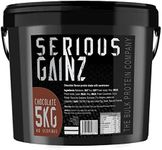Buying Guide for the Best Protein Powders
Choosing the right protein powder can be a game-changer for your fitness and health goals. Whether you're looking to build muscle, lose weight, or simply supplement your diet, understanding the different types of protein powders and their key specifications can help you make an informed decision. It's important to consider your dietary preferences, fitness goals, and any potential allergies or intolerances when selecting a protein powder. By focusing on the key specifications, you can find a product that aligns with your needs and supports your overall health and wellness journey.Protein SourceProtein source refers to the origin of the protein in the powder, which can be animal-based like whey or casein, or plant-based like soy, pea, or rice. This is important because different sources have varying amino acid profiles and digestibility. Whey protein is popular for muscle building due to its complete amino acid profile and fast absorption. Plant-based proteins are great for those with dietary restrictions or preferences, such as vegans or those with lactose intolerance. Choose a protein source that aligns with your dietary needs and fitness goals.
Protein Content per ServingProtein content per serving indicates how much protein you get in each scoop or serving of the powder. This is crucial for meeting your daily protein intake goals, especially if you're using the powder to support muscle growth or recovery. Protein content can range from 15 grams to over 30 grams per serving. If you're looking to build muscle, aim for higher protein content. For general supplementation, a moderate amount may suffice. Consider your overall diet and how much protein you need to supplement when choosing the right content.
Amino Acid ProfileThe amino acid profile refers to the types and amounts of amino acids present in the protein powder. Amino acids are the building blocks of protein and are essential for muscle repair and growth. A complete amino acid profile, which includes all nine essential amino acids, is ideal for muscle building and recovery. Whey protein typically has a complete profile, while some plant-based proteins may need to be combined to achieve this. If muscle building is your goal, ensure the powder has a complete amino acid profile or consider combining different sources.
DigestibilityDigestibility refers to how easily your body can break down and absorb the protein. This is important for ensuring that your body can effectively use the protein for muscle repair and growth. Whey protein is known for its high digestibility, while some plant-based proteins may be harder to digest. If you have a sensitive stomach or digestive issues, look for protein powders that are labeled as easily digestible or have added digestive enzymes. Consider your digestive health and how quickly you need the protein to be absorbed when making your choice.
Flavor and SweetenersFlavor and sweeteners determine the taste of the protein powder, which can affect your willingness to consume it regularly. This is important because a protein powder that tastes good to you will be easier to incorporate into your daily routine. Flavors range from chocolate and vanilla to more exotic options, and sweeteners can be natural or artificial. If you prefer a natural taste, look for powders with natural sweeteners like stevia. Consider your taste preferences and any dietary restrictions related to sweeteners when selecting a flavor.
Additives and FillersAdditives and fillers are extra ingredients that may be included in protein powders, such as thickeners, preservatives, or artificial flavors. These can impact the nutritional quality and taste of the product. It's important to be aware of these ingredients, especially if you have allergies or prefer a clean label product. Some people prefer protein powders with minimal additives for a more natural product. Consider your health priorities and any sensitivities when evaluating the ingredient list of a protein powder.














